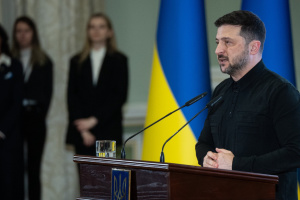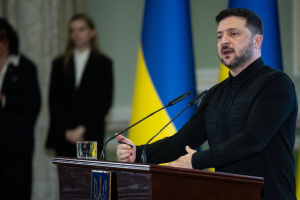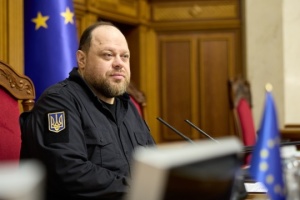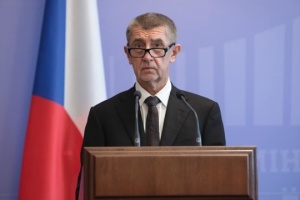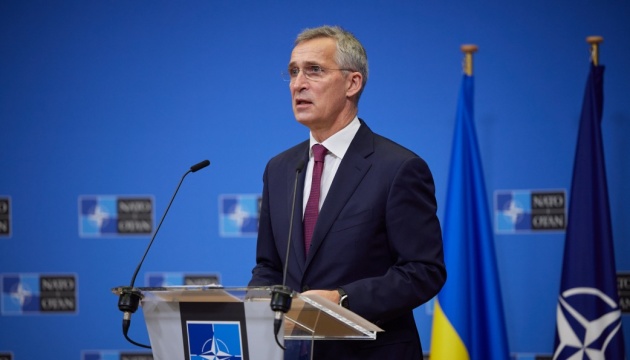
NATO calls on Russia to de-escalate, withdraw troops from Ukraine's borders
This was stated by NATO Secretary General Jens Stoltenberg during an urgent press conference in Brussels on Wednesday, January 26, an Ukrinform correspondent reports.
"We face a critical moment for Euro-Atlantic security. Russia’s military build-up in and around Ukraine continues, with more than 100,000 troops in position, and more on the way, including significant deployments in Belarus. We call on Russia once again to immediately de-escalate the situation. NATO firmly believes that tensions and disagreements must be resolved through dialogue and diplomacy. Not through force or the threat of force. So today, NATO has conveyed our written proposals to Russia. We have done so in parallel with the United States," Stoltenberg said.
The secretary general outlined the three main areas where NATO sees room for progress.
In particular, the first is NATO-Russia relations. The secretary general recalled that Russia had cut diplomatic ties with the Alliance, making dialogue much more difficult. He called for re-establishing the respective offices in Moscow and Brussels. He said the parties should also make full use of existing military-to-military channels to promote transparency and reduce risks. The Alliance is also considering setting up a civilian hotline for emergency use.
"Second, European security, including the situation in and around Ukraine. We are prepared to listen to Russia’s concerns, and engage in a real conversation on how to uphold and strengthen the fundamental principles of European security that we have all signed up to, starting with the Helsinki Final Act. This includes the right of each nation to choose its own security arrangements. Russia should refrain from coercive force posturing, aggressive rhetoric, and malign activities directed against Allies and other nations," said the NATO secretary general.
He stressed that Russia must withdraw its forces from Ukraine, Georgia, and Moldova, where they are deployed “without these countries’ consent.” All parties should engage constructively in conflict settlement efforts, including in the Normandy format.
According to Stoltenberg, the third area is risk reduction, transparency, and arms control.
"History has shown that engagement on these issues can provide real security for everyone. So we need practical measures that will make a real difference. As a first step, we are proposing mutual briefings on exercises and nuclear policies in the NATO-Russia Council. We should also modernize the Vienna Document on military transparency, and work to reduce space and cyber threats. We should consult on ways to prevent incidents in the air and at sea and recommit to full compliance with international commitments on chemical and biological weapons," said the Alliance leader.
NATO is also proposing to start a "serious conversation" on arms control, including nuclear weapons and ground-based intermediate and shorter-range missiles.
These areas, the NATO Secretary General stressed, are on the agenda for a meaningful dialogue. He invited allies and Russia to hold a series of meetings to address all these issues in more detail within the NATO-Russia Council, and expressed the Alliance's readiness to hold such a meeting "as soon as possible."
"In all of our efforts, we continue to coordinate closely with Ukraine, as well as with other NATO partners, including Finland, Sweden, Georgia, and of course, the European Union. NATO is a defensive Alliance, and we do not seek confrontation. But we cannot and will not compromise on the principles on which the security of our Alliance and security in Europe and North America rest. We remain fully committed to our founding treaty, and our collective defense pledge enshrined in Article 5. We will take all necessary measures to defend and protect all Allies," Stoltenberg concluded.
Earlier, U.S. Secretary of State Antony Blinken said the United States had conveyed to Russia a written response to proposals for "security guarantees" in Europe.
In December 2021, the Russian Federation made public its "security guarantees" proposals in the form of draft treaties with the United States and NATO, which contain ultimate demands to reduce the Alliance's activity and abandon the open-door policy, in particular as regards Ukraine and Georgia.
Intensive diplomatic contacts with Russia, the United States, NATO, and the OSCE have been underway over the past week.
im

